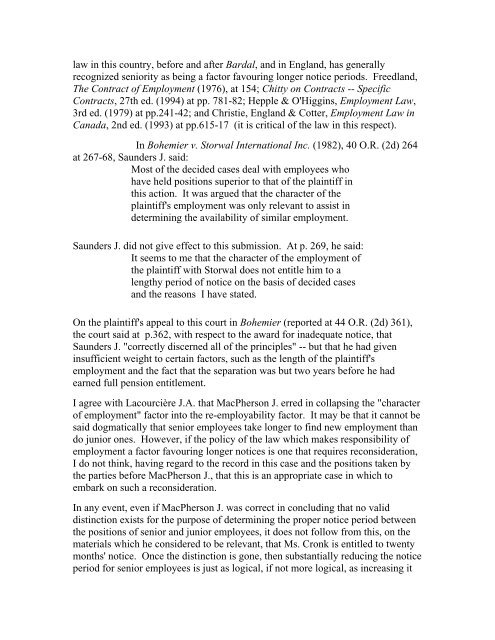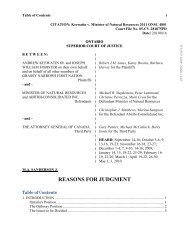Cronk v. Canadian General Insurance Co., 1995 CanLII 814 (ON CA)
Cronk v. Canadian General Insurance Co., 1995 CanLII 814 (ON CA)
Cronk v. Canadian General Insurance Co., 1995 CanLII 814 (ON CA)
Create successful ePaper yourself
Turn your PDF publications into a flip-book with our unique Google optimized e-Paper software.
law in this country, before and after Bardal, and in England, has generally<br />
recognized seniority as being a factor favouring longer notice periods. Freedland,<br />
The <strong>Co</strong>ntract of Employment (1976), at 154; Chitty on <strong>Co</strong>ntracts -- Specific<br />
<strong>Co</strong>ntracts, 27th ed. (1994) at pp. 781-82; Hepple & O'Higgins, Employment Law,<br />
3rd ed. (1979) at pp.241-42; and Christie, England & <strong>Co</strong>tter, Employment Law in<br />
Canada, 2nd ed. (1993) at pp.615-17 (it is critical of the law in this respect).<br />
In Bohemier v. Storwal International Inc. (1982), 40 O.R. (2d) 264<br />
at 267-68, Saunders J. said:<br />
Most of the decided cases deal with employees who<br />
have held positions superior to that of the plaintiff in<br />
this action. It was argued that the character of the<br />
plaintiff's employment was only relevant to assist in<br />
determining the availability of similar employment.<br />
Saunders J. did not give effect to this submission. At p. 269, he said:<br />
It seems to me that the character of the employment of<br />
the plaintiff with Storwal does not entitle him to a<br />
lengthy period of notice on the basis of decided cases<br />
and the reasons I have stated.<br />
On the plaintiff's appeal to this court in Bohemier (reported at 44 O.R. (2d) 361),<br />
the court said at p.362, with respect to the award for inadequate notice, that<br />
Saunders J. "correctly discerned all of the principles" -- but that he had given<br />
insufficient weight to certain factors, such as the length of the plaintiff's<br />
employment and the fact that the separation was but two years before he had<br />
earned full pension entitlement.<br />
I agree with Lacourcière J.A. that MacPherson J. erred in collapsing the "character<br />
of employment" factor into the re-employability factor. It may be that it cannot be<br />
said dogmatically that senior employees take longer to find new employment than<br />
do junior ones. However, if the policy of the law which makes responsibility of<br />
employment a factor favouring longer notices is one that requires reconsideration,<br />
I do not think, having regard to the record in this case and the positions taken by<br />
the parties before MacPherson J., that this is an appropriate case in which to<br />
embark on such a reconsideration.<br />
In any event, even if MacPherson J. was correct in concluding that no valid<br />
distinction exists for the purpose of determining the proper notice period between<br />
the positions of senior and junior employees, it does not follow from this, on the<br />
materials which he considered to be relevant, that Ms. <strong>Cronk</strong> is entitled to twenty<br />
months' notice. Once the distinction is gone, then substantially reducing the notice<br />
period for senior employees is just as logical, if not more logical, as increasing it
















